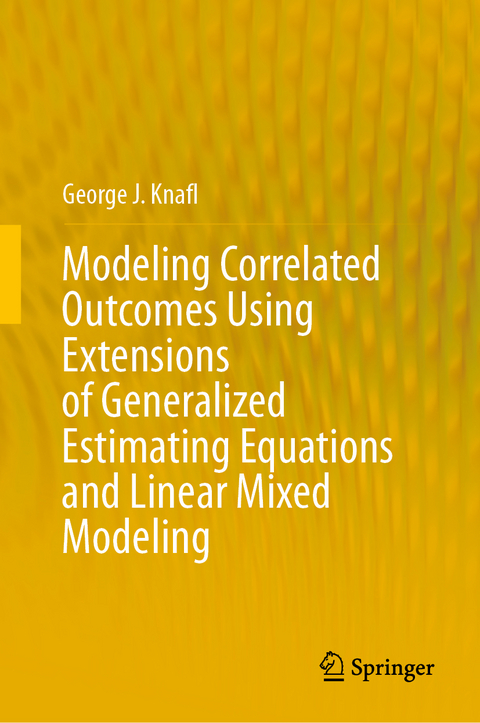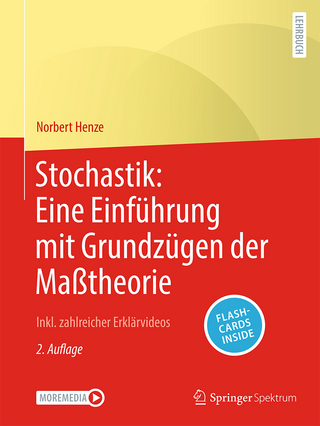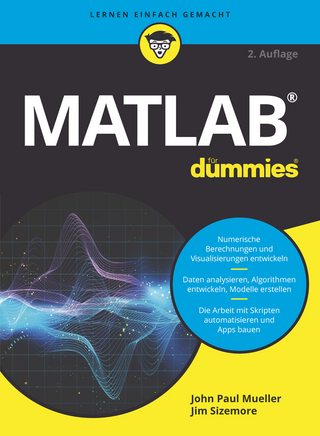
Modeling Correlated Outcomes Using Extensions of Generalized Estimating Equations and Linear Mixed Modeling
Springer International Publishing (Verlag)
978-3-031-41987-4 (ISBN)
Standard GEE, partially modified GEE, fully modified GEE, and ELMM are demonstrated and compared using a variety of regression analyses of different types of correlated outcomes. Example analyses of correlated outcomes include linear regression for continuous outcomes, Poisson regression for count/rate outcomes, logistic regression for dichotomous outcomes, exponential regression for positive-valued continuous outcome, multinomial regression for general polytomous outcomes, ordinal regression for ordinal polytomous outcomes, and discrete regression for discrete numeric outcomes. These analyses also address nonlinearity in predictors based on adaptive search through alternative fractional polynomial models controlled by likelihood cross-validation (LCV) scores. Larger LCV scores indicate better models but not necessarilydistinctly better models. LCV ratio tests are used to identify distinctly better models.
A SAS macro has been developed for analyzing correlated outcomes using standard GEE, partially modified GEE, fully modified GEE, and ELMM within alternative regression contexts. This macro and code for conducting the analyses addressed in the book are available online via the book's Springer website. Detailed descriptions of how to use this macro and interpret its output are provided in the book.
lt;b>George J. Knafl is Biostatistician and Professor Emeritus in the School of Nursing of the University of North Carolina at Chapel Hill where he taught statistics courses for doctoral nursing students, consulted with doctoral students and faculty on their research, and conducted his own research. He has over 45 years of experience in teaching, consulting, and research in statistics. He has continued to conduct research involving development of methods for searching through alternative models for different types of statistical data and application of those methods to the analysis of a variety of health science data sets. He is also Professor Emeritus in the College of Computing and Digital Media at DePaul University and has served on the faculties of the Schools of Nursing at Yale University and at the Oregon Health and Science University.
- 1. Introduction. - Part I Continuous, Count, and Dichotomous Outcomes. - 2. Standard GEE Modeling of Correlated Univariate Outcomes. - 3. Partially Modified GEE Modeling of Correlated Univariate Outcomes. - 4. Fully Modified GEE Modeling of Correlated Univariate Outcomes. - 5. Extended Linear Mixed Modeling of Correlated Univariate Outcomes. - 6. Example Analyses of the Dental Measurement Data. - 7. Example Analyses of the Epilepsy Seizure Rate Data. - 8. Example Analyses of the Dichotomous Respiratory Status Data. - 9. Example Analyses of the Blood Lead Level Data. - Part II Polytomous Outcomes. - 10. Multinomial Regression. - 11. Ordinal Regression. - 12. Discrete Regression. - 13. Example Multinomial and Ordinal Regression Analyses. - 14. Example Discrete Regression Analyses. - Part III Adaptive Analysis Strategies. - 15. Alternative Analyses. - 16. Additional Example Analyses.
| Erscheinungsdatum | 26.01.2024 |
|---|---|
| Zusatzinfo | XXV, 515 p. 65 illus., 43 illus. in color. With online files/update. |
| Verlagsort | Cham |
| Sprache | englisch |
| Maße | 155 x 235 mm |
| Gewicht | 973 g |
| Themenwelt | Mathematik / Informatik ► Mathematik ► Wahrscheinlichkeit / Kombinatorik |
| Schlagworte | adaptive modeling • Correlated Outcomes • Extended Linear Mixed Modeling • generalized estimating equations • Likelihood Cross-Validation • Moderation • Newton's method • nonlinearity • Regression |
| ISBN-10 | 3-031-41987-1 / 3031419871 |
| ISBN-13 | 978-3-031-41987-4 / 9783031419874 |
| Zustand | Neuware |
| Haben Sie eine Frage zum Produkt? |
aus dem Bereich


